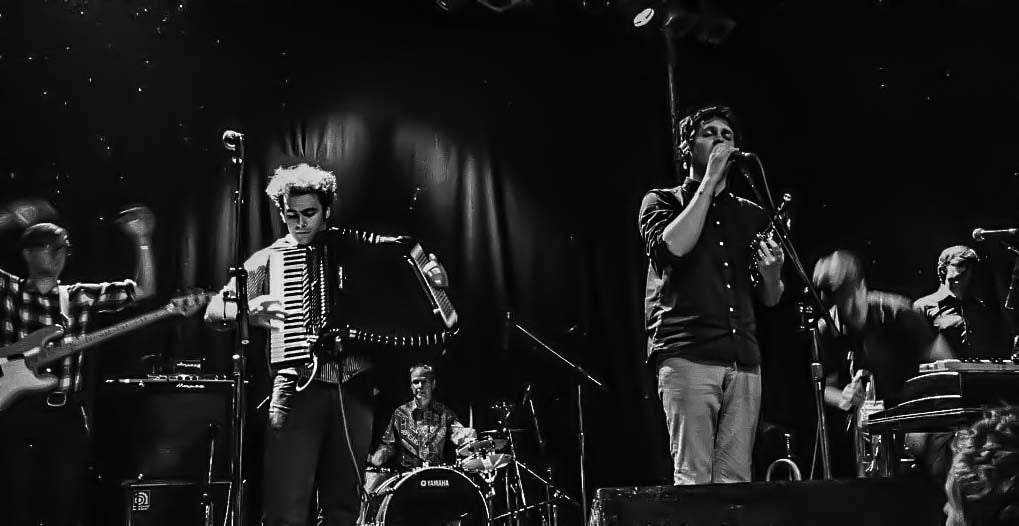
Beirut Unleashed: A Harmonious Journey Through My Musical Odyssey w/ the Band
Share
I appreciate simplicity. I’m not sure I’ve always been that way, probably to some degree, but over the years, through experience and trauma, simplicity has become more important to me.
Beirut is not a simple band. Between the trumpets, flugelhorn, guitar, upright bass, keyboards, trombone, ukulele, sousaphone, melodica, violin, accordion, glockenspiel, drums, euphonium, saxophone, mandolin, cello, and French horn, you’d expect their sound to be anything but simple. But somehow, the way Zach Condon layers his music—how the instruments fall into place—delivers something quietly brilliant. It’s complex, but it doesn’t feel complicated.
My sister introduced me to Beirut after The Flying Club Cup was released. She said it was the best album of the year, raving about how perfect it was. It took me a while to give it a try. I don’t know why. One afternoon, I went for a drive. Beirut came with me. I was floored listening to it. The album was phenomenal. I downloaded it and let it play through my speakers as I lay on my bed, eyes closed, listening to every nuance. It was beautiful.
I grew up in Texas. Texas has some of the most incredible thunderstorms, the kind that stay with you; rain that goes on for hours, thunder bellowing nearby. I listened to Beirut while it rained, the rooftop getting bombed, pit-patters on the windows, the smell of rain rising through the fractures in the house. Music can be visceral if you let it. You can feel it. Vibrations that envelop you influence your emotions and shape your thoughts. Listening to Beirut is like meditation, when you ground yourself and slow your breathing.
For the same reason, Beirut is one of my favorite bands to listen to while hiking. Hiking alone in the Montana wilderness can be precarious. It’s smart to play music or a podcast so nearby wildlife knows you’re there. Beirut works. It’s atmospheric, but it doesn’t distract. It settles into your surroundings as if it were radiating from the trees.
Zach Condon founded Beirut as a solo project before the band made its New York debut in 2006. He’s from Santa Fe, New Mexico—one of my favorite places. I moved there after Condon left. Well, after The Flying Club Cup was released. He still loves the city and returns often.
Beirut doesn’t tour much, which is a shame. They put on unbelievable performances. I saw them play at the Santa Fe Community Center. Probably not the best venue, it has poor acoustics, but it was still one of my favorite shows.
If you know Beirut, you know they’re distinct. Not just because of the lineup of instruments, but because of Condon’s voice. It’s haunting and unmistakable. Maybe that’s why I liked listening to them while it rained. The sound resonates with the hollow intrigue of heavy rainfall. It feels like being inside a cloud.
Beirut has eight studio albums, including The Flying Club Cup, Hadsel (2023), and their most recent release, A Study of Losses, which they released in April 2025. The album was commissioned by the Swedish circus company Kompani Giraff and inspired by Judith Schalansky’s An Inventory of Losses, a book about things that have vanished: species, places, works of art, fragments of memory. Condon recorded most of it in Berlin and northern Norway, with additional string sessions in New York. It’s a quieter album, full of instrumental pieces and songs named after things that no longer exist— “Caspian Tiger,” “Sappho’s Poems,” “Villa Sacchetti.”
The standout track, “Guericke’s Unicorn,” is one of the few that stretches past four minutes. It’s paired with a music video that leans into the album’s themes of impermanence and imagination. A Study of Losses doesn’t feel like a departure; it feels like the band’s deepening. A meditation on absence, not in the dramatic sense, but in the quiet erosion of things once known.
If you’re new to Beirut, watch the Blogothèque Take Away Shows of “The Penalty” and “Nantes.” It’s a great introduction—or, if you already know them, a side you might not have seen. There’s also a Beirut Greatest Hits collection on YouTube that someone put together. It’s a solid tribute to a band that’s still, somehow, underappreciated.